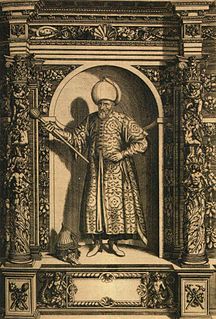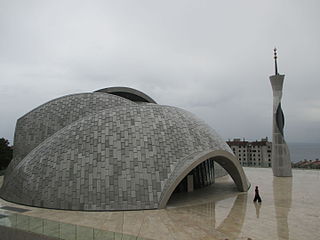This page is based on this
Wikipedia article Text is available under the
CC BY-SA 4.0 license; additional terms may apply.
Images, videos and audio are available under their respective licenses.
Muslims or Muslimans as a designation for a particular ethnic group, refers to one of six officially recognized constituent peoples in the former Yugoslavia. The term was adopted in 1971, as an official designation of ethnicity for Yugoslav Slavic Muslims, thus grouping together a number of distinct South Slavic communities of Islamic ethnocultural tradition, among them most numerous being the modern Bosniaks of Bosnia and Herzegovina, along with some smaller groups of different ethnicity, such as Gorani and Torbeši. This designation did not include Yugoslav non-Slavic Muslims, such as Albanians, Turks, and Romani.
Muslim Slavs or Slavic Muslims are ethnic groups or sub-ethnic groups of Slavs who are followers of Islam. The term is most often used in study of Balkans. The majority of Slavic Muslims are found in Bosnia and Herzegovina, southern Serbia and south-west Bulgaria.

Islam is the most widespread religion in Bosnia and Herzegovina. It was introduced to the local population in the 15th and 16th centuries as a result of the Ottoman conquest of Bosnia and Herzegovina.
Muslims comprise the single largest religious community in Bosnia and Herzegovina (51%).
Croatian Canadians are Canadian citizens who are of Croatian descent. The community exists in major cities including the Greater Toronto Area, Hamilton, Ottawa, Vancouver, Calgary, Edmonton, Windsor, and Montreal.

The dominant religion in Vojvodina is Orthodox Christianity, mainly represented by the Serbian Orthodox Church, while other important religions of the region are Catholic Christianity, Protestant Christianity, Islam, and Judaism.

Islam is the largest and majority religion in Sierra Leone. Based on the 2015 Pew Research Center research, 78℅ of Sierra Leone's population is Muslim. And also Based on the 2015 national census, 75℅ of Sierra Leone's population is Muslim last conducted a census in 2009 and estimates there are 4,059,000 Muslims in Sierra Leone.

Islam in Montenegro refers to adherents, communities and religious institutions of Islam in Montenegro. It is the second largest religion in the country, after Christianity. According to the 2011 census, Montenegro's 118,477 Muslims make up 20% of the total population. Montenegro's Muslims belong mostly to the Sunni branch.

Serbia has been traditionally a Christian country since the Christianization of Serbs by Clement of Ohrid and Saint Naum in the 9th century. The dominant confession is Eastern Orthodoxy of the Serbian Orthodox Church. During the Ottoman rule of the Balkans, Sunni Islam established itself in the territories of Serbia, mainly in southern regions of Raška and Preševo Valley, as well as in the disputed territory of Kosovo and Metohija.
The Catholic Church has roots in the country since the presence of Hungarians in Vojvodina, while Protestantism arrived in the 18th and 19th century with the settlement of Slovaks in Vojvodina.

While Orthodox Christianity is the dominant form of religion in Montenegro, there are also sizable numbers of adherents of both Islam and Catholic Christianity. The dominant Church is the Serbian Orthodox Church although traces of a forming Montenegrin Orthodox Church are present.
Bosniak - Bošnjak - may refer to:

The State Constitution of Bosnia and Herzegovina (BiH) and the entity Constitutions of the Federation of Bosnia and Herzegovina and the Republika Srpska provide for freedom of religion, and the Government generally respects this right in ethnically integrated areas or in areas where government officials are of the majority religion; the state-level Law on Religious Freedom also provides comprehensive rights to religious communities. However, local authorities sometimes restricted the right to worship of adherents of religious groups in areas where such persons are in the minority. 54% of Herzegovinian and Bosnian Muslims consider themselves as "just muslims".
Muslims are adherents of Islam.

Arab Muslims are adherents of Islam who identify linguistically, culturally, and genealogically as Arabs. Arab Muslims greatly outnumber other ethnic groups in the Middle East and North Africa.
Bosnians are referred to as members of the general population of Bosnia, one of two main regions of Bosnia and Herzegovina. As a common demonym, the term Bosnians refers to the entire population of the region, regardless of any ethnic or religious affiliation. It can also be used as a designation for anyone who is descended from the region of Bosnia. Also, a Bosnian can be anyone who holds citizenship of the state of Bosnia and Herzegovina and thus is largely synonymous with the all-encompassing national demonym Bosnians and Herzegovinians. This includes, but is not limited to, members of the constituent ethnic groups of Bosnia and Herzegovina: Bosniaks, Serbs, and Croats. Those who reside in the smaller geographical region of Herzegovina usually prefer to identify as Herzegovinians.

The term Serb Muslims refers to ethnic Serbs who are Muslims by their religious affiliation. Since it is defined by ethnicity and religion, term Serb Muslims should not be confused with term Serbian Muslims that refers generally to all adherents of Islam in Serbia, regardless of their ethnicity.
The term Yugoslav Muslims may refer to
Serbian Muslims are adherents of Islam in Serbia.










